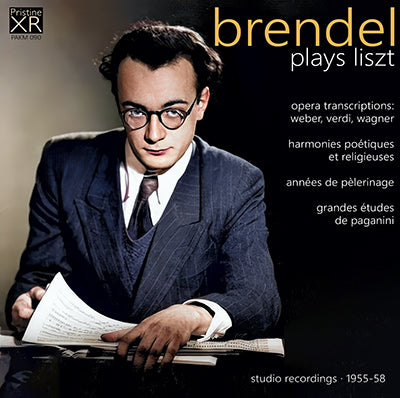
This album is included in the following sets:
This set contains the following albums:
- Producer's Note
- Full Track Listing
- Cover Art
Do composers gain from posthumous anniversaries? If their greatness is well enough established, the playing of their lesser-known works may further enhance their reputation; if unduly neglected, they may be helped out of their oblivion. Those afflicted by a history of chronic misrepresentation, pervasive malice, and lingering doubt stand the slimmest chance. Celebrating the 100th anniversary of Liszt’s death and the 175th of his birth, a plethora of Liszt festivals, marathons, and competitions this year may well prove to have further obscured the stature of a man who has to be defended on several fronts: against some of his champions and partisan admirers, against the crowd of skeptics and adversaries, and, to a lesser extent, against himself.
When Liszt died, he made the mistake of leaving behind an unusual legacy of envy. There is a relation between envy and posthumous fame. Liszt’s early European success as virtuoso and improviser equaled that of Mozart; a few years later, his “genius of expression” (Schumann) and boundless pianistic skill made him, as a player, superior even to Chopin, Mendelssohn, or Clara Schumann. The combination of a lively mind, personal magnetism, masculine beauty, the social triumphs enjoyed by a privileged parvenu, and a love life bordering on scandal turned out to be, within one human being, barely forgivable. There was a conspicuous absence of mitigating circumstances such as Mozart’s or Schubert’s early death, Mozart’s alleged impoverishment and unmarked “pauper’s grave,” Schubert’s syphilis, Beethoven’s deafness, Chopin’s consumption, or Schumann’s mental disorder—features that make the fame of a genius a great deal more gratifying, and guarantee its solidity. (Wagner’s monstrous egotism and merciless promotion of his own ends, while not stimulating compassion or malicious glee, present a frame of mind many people enjoy sharing.)
Arguably, Liszt and Haydn are the most frequently misunderstood among major composers; their biographers afford little food for pity. (The insufferable bigotry of Haydn’s wife and the senility of his last years do not, it seems, sufficiently atone for his achievement in being the first great symphonist and the grand master of the string quartet.) In old age, Haydn reigned over the musical world as its undisputed leading light. For this, the nineteenth century punished him—as it punished Liszt for his undisputed supremacy as a performer. Haydn was branded the ingenious classicist (something he rarely was), “the family friend who is always welcome but has nothing to say that is new” (Schumann). Liszt, in his compositions, was seen as a poseur and charlatan (which he only occasionally was), the embodiment of a superficial and bombastic romanticism. Not until our century did a greater number of composers—from Richard Strauss, Ravel, and Busoni to Schoenberg, Bartok, and Boulez—appreciate Liszt by taking him seriously.
– Alfred Brendel, The New York Review of Books, 20 November 1986 (introduction - full article available here)
Alfred Brendel has long championed the music of Franz Liszt: his recording career began in 1952 with a recording of Liszt's "Weihnachtsbaum" - its première recording - and he continued to record and perform the composer's music throughout his lengthy career. The 1950s saw Brendel make a good number of Liszt recordings on the Vox label prior to signing to Philips, where he was to spend the rest of his career. Vox were, in many ways, a pioneering label at the time, but technically their recordings sometimes fell short of the best of the era. In this selection of I hope to demonstrate the genius of the young Brendel's Liszt interpretations in sound quality that does full justice to his playing, addressing not only tonal issues but also pitch instability and unwanted background noises, thus offering the finest possible representation of these exquisite performances.
Andrew Rose
BRENDEL plays Liszt
LISZT Harmonies poétiques et religieuses III, S.173
1. No. 10 - Cantique d'Amour (6:24)
2. No. 3 - Bénédiction de Dieu dans la solitude (15:35)
3. No. 7 - Funérailles (10:57)
Recorded Mach 1955
4. WEBER (arr. Liszt) Oberon - Overture, S.574 (9:09)
5. VERDI (arr. Liszt) Il trovatore - Miserere du Trovatore, S.433 (8:17)
6. WAGNER (arr. Liszt) Tristan und Isolde - Isoldes Liebestod, S.447 (6:14)
Recorded 1958
LISZT Années de pèlerinage II, S.161
7. No. 4 - Sonetto 47 del Petrarca (5:57)
8. No. 5 - Sonetto 104 del Petrarca (6:07)
Recorded 1957
LISZT Grandes études de Paganini, S.141
9. No. 2 - Andante (5:42)
10. No. 3 - La Campanella. Allegretto (5:03)
Recorded 1958
Alfred Brendel, piano
XR Remastered by Andrew Rose
Cover artwork based on a photograph of Alfred Brendel
Original recordings made by Vox
Total duration: 79:25

